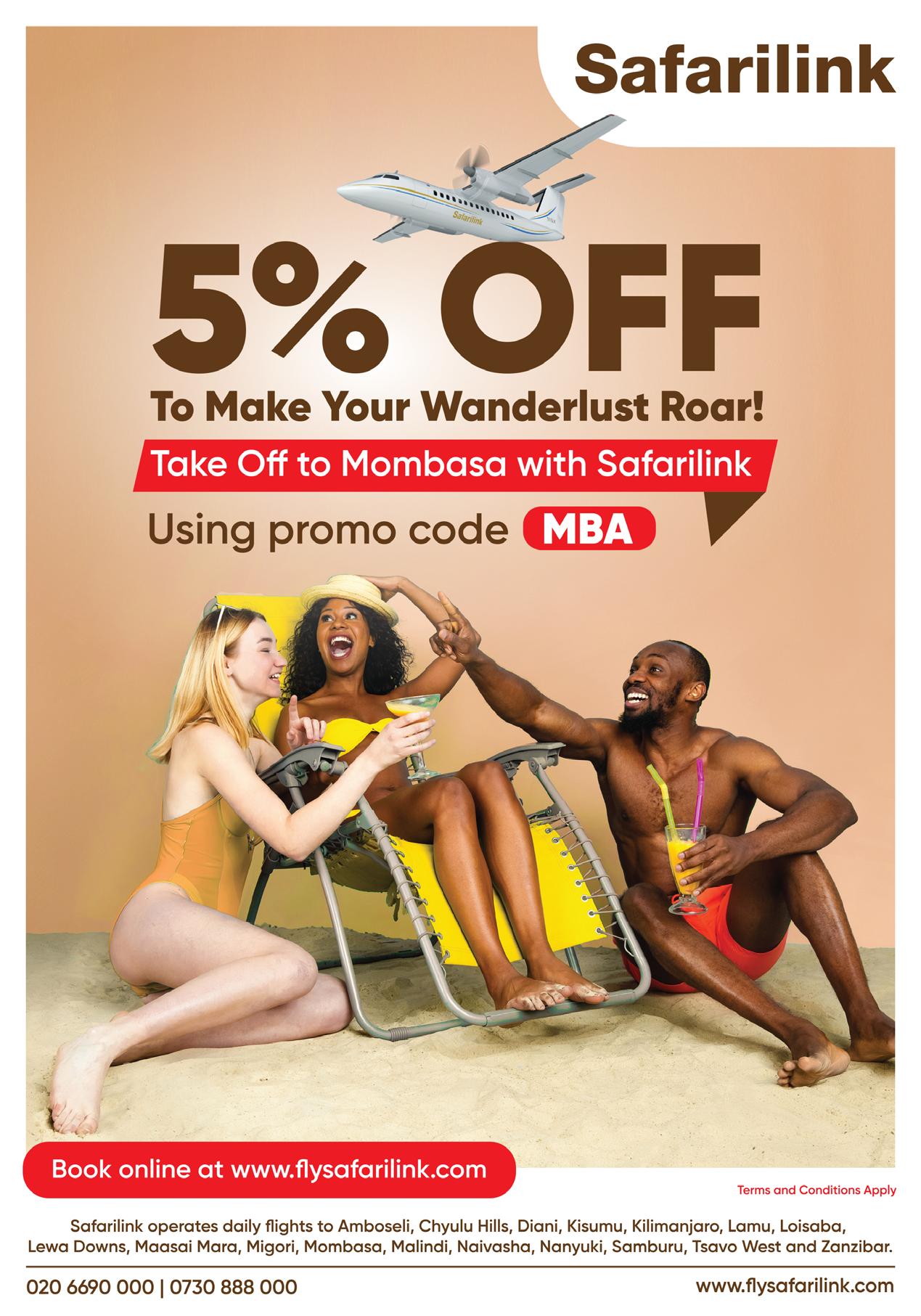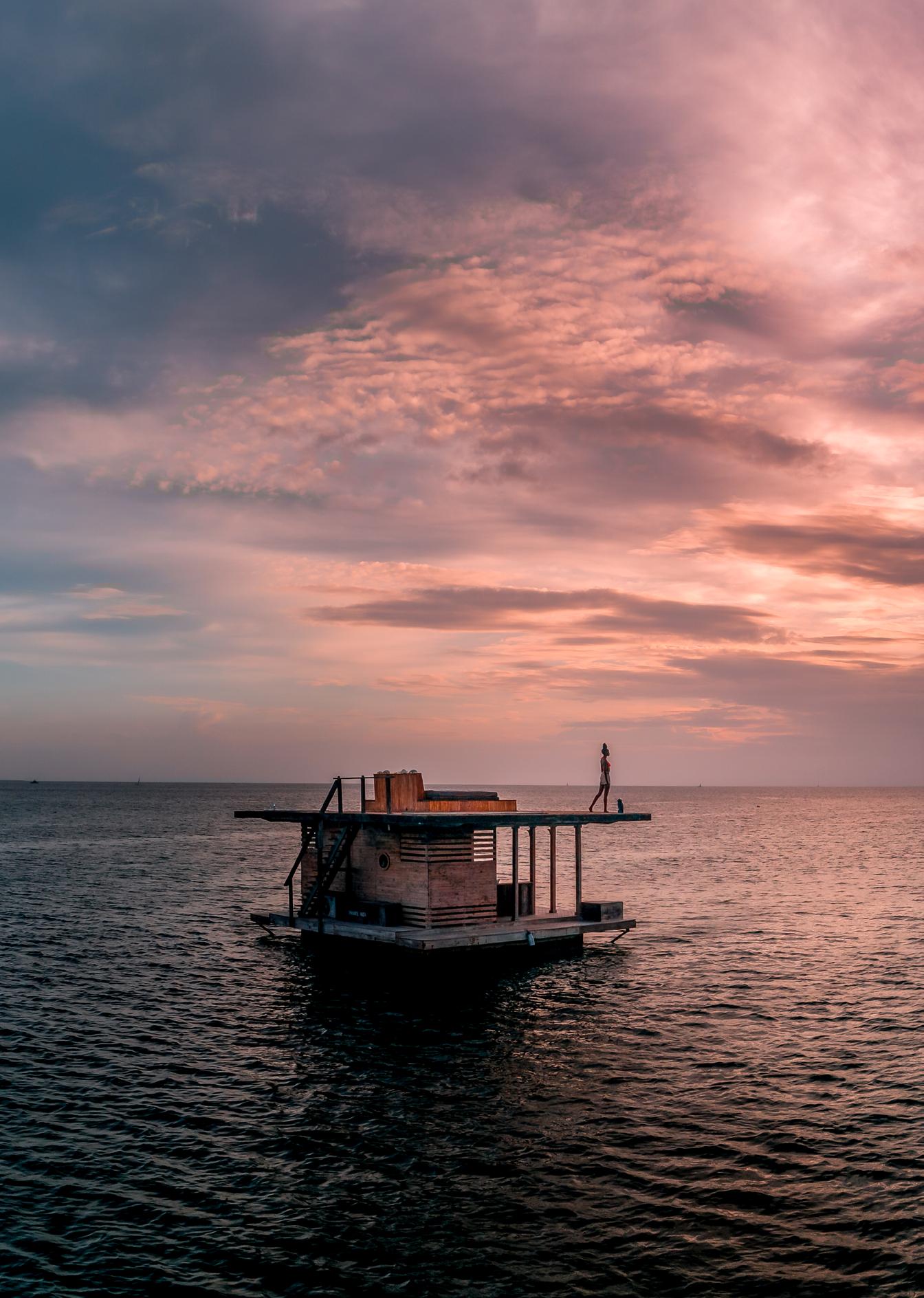

TRAVEL
JOIN
RESIDENT RATES
Online access to discounted rates for Kenyan residents
EXCLUSIVE OFFERS & PERKS
Unlock access to special deals and discounts
LOYALTY PROGRAMME
Get rewarded for doing what you love
JOIN CLUB

It's the ultimate membership club for Kenyan Residents. And it's free.
All you have to do is sign up.





Message from the Guest Editor: Embracing Luxury
Dear readers,
I am excited to be guest editing this September issue of Nomad magazine, which takes a special focus on luxury in Africa – through the lens of luxury properties. As a Journalist, PR maven, and Travel Content Creator, I have had the privilege of visiting some of the most luxurious properties on the continent from exclusive islands in Zanzibar to high-end resorts in Rwanda.
In this issue, we explore the different ways that luxury is defined in Africa. We talk to VIP travel concierges to find out what their clients really want, and we investigate the growing trend of eco-luxury travel. We also take a look at some of the most luxurious hotels in Africa, including Singita, Hotel Tamsna, and Sussurro. I am particularly proud of the fact that all of the contributors to this issue are women. I believe that women have a unique perspective on luxury, and I am excited to share their stories with you. The cover photo of this issue is a picture of me, standing on the topmost section of the underwater room at Manta Resort in Zanzibar. A breathtaking bucket list experience, and made possible through their marine conservation efforts. For me, a luxury property is one that strives to do the hard things and do the right things,
to ensure guests can have life-changing memories. I hope this issue of Nomad inspires you to rethink your views on luxury travel in Africa. Thank you for reading,
Sharon Machira Sharon Machira, Guest Editor, Nomad MagazineP.S. Many of the images in this publication have been provided by Emma Jude Jackson, founder of Her Hotels –a collection of her most adored hotels & Airbnbs, around the world, curated by Emma. I am grateful to her for sharing her beautiful images with us.

In this Issue,
Past & Upcoming Events
Noteworthy events, recently and coming up
Hot Shots
Top Pictures by African photographers
Is Wellness the New Luxury?

A Spotlight on Singita in Rwanda
Eco-Luxury Hotels
Are these just a new hype?
Lengishu House
A personalized, private experience
VIP Travel Concierge
An interview with Bonita Utoni
São Tomé and Príncipe
A travel guide to these two islands
Travelling by Design
In conversation with Sussuro, Mozambique
What we Pack
Nomad holiday essentials
A tribute to Loum-MartinMeryanne
Founder of Jnane Tamsna Hotel in Marrakech Gift Guide
Spotlight on East African brands
24hrs in Paje
By Fay the Nomad
CONTENTS
Mnemba Island
Through the lens of Emma Jude
CEO Lizzie Wright
HEAD OF CONTENT Ludo Fioravanti
HEAD OF OPERATIONS Jodi York
GUEST EDITOR Sharon Machira

DESIGN Karan Khalsa
TRAVEL OPERATIONS MANAGER Carol Soi
EXPERIENCE BUILDER Ann Wambui
FINANCE & ADMIN LEAD Wambui Everlyne
ENQUIRIES bookings@nomad.africa
Kilifi Gold Triathlon (KGT) Folk Fusion


23rd September 2023
The KGT is an annual fundraising event for the Kilifi community and stands out as the most renowned sprint triathlon event in East Africa. The race kicks off with a swim, as participants traverse the boat channel within Kilifi Creek. After this, competitors then transition to their bikes for a 20km ride through the forest. To finish, they embark on a 5km run that includes navigating the terrain of Cardiac Hill before making their way onto the beach and crossing the finish line.
Concours D'elegance

24th September 2023
The Africa Concours d’Elegance is one of the classiest motorsports events in Kenya. Organised by the Alfa Romeo Owners Club, the event is a social occasion and fun-filled family day. It includes a competition where 70 classic and vintage cars and 40 motorcycles are showcased and a winner is crowned. The show also features a children’s entertainment centre, live band music, flypasts, a parade of all the Concours cars and motorcycles and a grand finale after the prize giving. In addition to the assessment of the classic and vintage cars and motorcycles, there are 28 Motor Trade stands, a MotorSport Arcade, a Classics Car and Motorcycle Sale section, and a collection of old machinery and equipment under the aptly named Heritage Collection section.
24th June 2023
Folk fusion is an event celebrating African music, Africans and Africa. Described as the home of traditional tunes, rhythm, movement and contemporary folk culture, Folk Fusion aims to showcase Kenya’s diverse culture through music, fashion, food, drinks, and art. The event takes place quarterly drawing all kinds of music lovers.
The Heng, 90s HangOut
30th September 2023
The Heng is a musical concert that seeks to take you back in time to celebrate the 90s. Organised by one of Kenya’s most sought-after entertainers, June Gachui, the show seeks to celebrate everything 90s from the food to the music, to the dress code. The event features live performances to celebrate this decade in its fullness.

Lamu Yoga Festival

25th - 29th October 2023
The Lamu Yoga Festival is a 5-day festival celebrating yoga, health, and wellness and attracts yoga enthusiasts from all over the world. Classes, workshops, and seminars are available, as are live music and cultural performances. The festival also provides an opportunity to learn about Lamu's beautiful culture and history.

Maulidi Festival Lamu Blankets and Wine Kenya
1st October 2023
Blankets and Wine is a quarterly, picnic-style, familyfriendly music festival based on 4 to 5 musical acts with different styles of urban African tunes. The event’s approach focuses on genres in Afro-jazz and Afro-soul as well as live music. The show is held every first Sunday of every quarter and the last Sunday before Christmas with different brand experiences through live music, food, craft and fashion.
20th - 22nd October 2023
Held in Lamu, Maulidi Festival is a four-day Islamic festival featuring traditional dances, donkey races, dhow races, swimming competitions, athletics and football. The festival is celebrated annually by a section of Muslims in remembrance of the birth of Prophet Muhammed in the holy city of Mecca in 570 AD. This is observed every third month of the Islamic calendar and is marked at Lamu’s Riyadh Mosque. It is a time when the community gathers together to share in food and dance as traders from all over the island come to showcase their goods.


Maganga Mwagogo is a photographer and director based in Nairobi, Kenya. The image is taken from a campaign I shot for Zurich based fashion brand Rafael Kouto, in Tsavo East National Park. My decision to shoot these conceptual designs in the endless Tsavo landscape was inspired by the collection’s text ‘There are no boundaries between earth and sky and we, as human beings, with the horizon and the clouds, are in the middle of this invisible circular connection.'





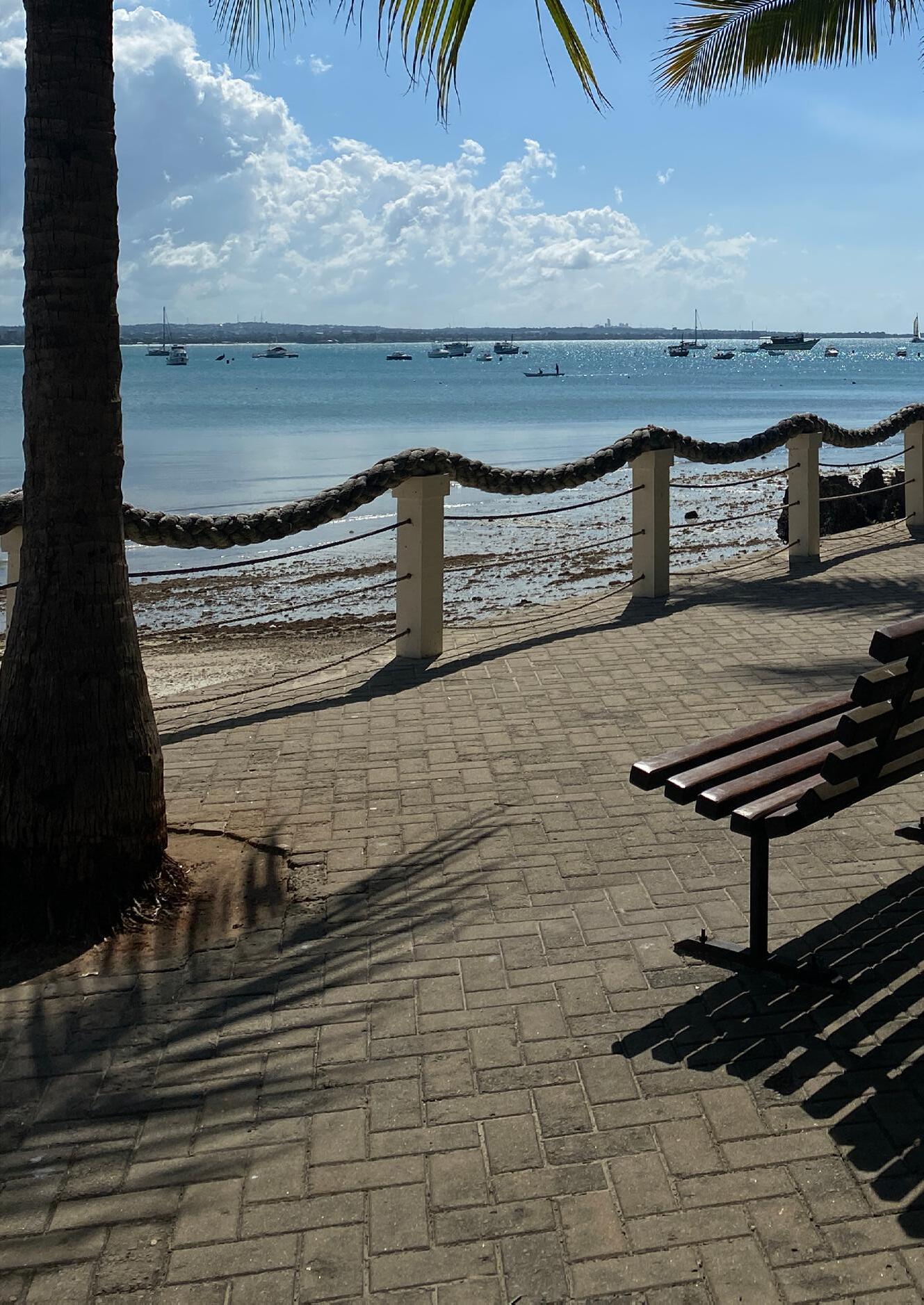
My Name is Tumtitu Entière Baseme, I am a Congolese-born Creative Storyteller & Digital Nomad, currently based in Nairobi, Kenya. I describe my work as a Documentary Exploration or a Visual Essay of people and places. I aim to capture moments and individuals in the most authentic and natural way to connect, captivate and inspire.




This is a picture I took on a solitary walk by the ocean at Slipway in Dar Es Salaam.


HOTSHOTS


My name is Danny Skilton, a photographer and filmmaker based in Nairobi. "I specialize in creating images outside. My work in adventure and travel photography sets out to capture stylized yet authentic moments in nature."


This photo captures our final moments in Diani before shaking off the sand, drying the Indian Ocean from our skin and heading back home.

Is Wellness the New Luxury? Spotlight on Singita


Singita Kwitonda: A place of miracles where wellness, luxury and ecotourism collide.
By Loise MachiraWellness tourism is a vibrant, fast-growing sector that will continue to lead the global tourism industry as more people worldwide seek healthier and happier lives. A post-COVID-19 wellness study by the Global Wellness Institute revealed that 56% of travellers now seek to enhance their health. Never in our history had a pandemic restricted movement to the capacity we all experienced, prompting greater health consciousness and a reconnection with nature.
There are two types of wellness travellers: those who prioritize wellness as their sole trip purpose (primary travellers) and those who maintain wellness routines during their travels (secondary travellers). Secondary travellers, like myself, adapt activities to their surroundings and pack accordingly. If we start viewing self-care as an investment in our health, a wellness-driven vacation becomes a logical choice.

In May this year, I took a trip to Rwanda and stayed at Singita Kwitonda, located in the Musanze district, in the northeastern part of Rwanda, a 3-hour drive from the capital city, Kigali. It was my first time at any Singita

property and possibly the most enriching trip I have had yet. Singita's 100-year commitment to preserving African wilderness through biodiversity, sustainability, and community engagement was evident in their eco-friendly lodges, reforestation projects, and community outreach. Situated near Volcanoes National Park, famous for mountain gorilla tracking, Singita contributes to gorilla conservation and strives for nature positivity amid climate change concerns.
According to the latest statistics, there are only an estimated 1,066 mountain gorillas left in the world. I learned that Singita’s efforts to increase the number of gorillas through reforestation and rehabilitation of the land have been successful. They also have a carbon credit programme and are consciously working towards being nature-positive. With the current global warming crisis and urgency to mitigate climate change, their approach to sustainability is commendable.
A destination that makes sure all my essentials are covered is a real treat. Guests are treated to an experience beyond expectation; luxury accommodation,
culinary excellence, cycling tours, and even educational tours. The villa was equipped with yoga mats, meditation playlists, Tibetan healing bowls, and yoga flow charts, creating a wellness sanctuary for the modern-day traveller. During the hiking trip, they provided topquality gear and a pre-trekking briefing by their resident conservationist with access to the best resources on gorilla conservation.
The nurturing ambience, humbling views, majestic horizons, and cosy corners are exactly what I needed to recharge and recalibrate. The bathroom is designed to give guests their own private spa with a stunning tub overlooking the mountains. Not only did I feel rejuvenated after this trip, but my soul was fully nourished. To be fully reconnected with nature is to be aligned with the divine or a higher deity, and in my case, with God.
In East Africa alone, we have the bragging rights to some of the most wholesome and beautiful travel experiences that will allow travellers to be at one with nature. With extensive coastlines for exclusive beach holidays, mesmerising wildlife tours, ocean excursions, and outdoor adventures, it’s a buzzing hub of adrenaline, and the region plays a critical role in the recovery of travel in Africa.
The real question is whether wellness luxury is worth the cost… and the answer is yes, absolutely. The price

we pay for attaining a state of mind that ignites selfdiscovery should not have a limitation because of how transformational the experience will be. Of course, some of these trips are tailored for a specific demographic, but we can also look at it from an aspirational perspective.
As I look through my journal entries from places I have travelled, the one thing that stands out (and doesn’t surprise me!) is that I am a thalassophile: A person who derives energy, peace and rejuvenation by being near the ocean. I find delight in the sound of the ocean waves hitting the beach and sinking my feet in the white sand. Something about being at sea is a reminder of how big the world is; that we share this majestic ocean with multiple countries and even continents.
Whereas Singita Kwitonda is not a beach destination, the collusion of ecotourism and luxury was an educational experience; I began to see the world with a new set of eyes. I was able to learn in high detail about the history of gorilla conservation and Singita’s commitment to the 30 x 30 initiative which is a global call to reserve 30% of nature by 2030. Before this trip, I didn’t know much about these initiatives, but I left feeling enlightened and empowered to share this knowledge with others.
Loise Machira is the Founder of Tizi Talks, a wellness blog that inspires a culture of enjoyable healthy living and is passionate about transformational travel.

Are HotelsEco-Luxury Just a Hype? My Thoughts as an Environmentalist

The luxury travel landscape is changing, and today’s travellers are seeking a more unique and authentic experience. Could eco-luxury hotels be the answer?
 By Mia Ruffo
By Mia Ruffo
We find ourselves at a pivotal moment where global efforts to combat the climate crisis and reverse the loss of biodiversity are of utmost importance; the goal being to create a safe and sustainable future. Today's travellers are more environmentally aware and seek authentic connections with the places they visit. There is a desire for connections with local cultures and a commitment to ensuring that local communities benefit equitably from tourism.
Enter eco-luxury travel, a travel approach perfectly tailored to meet these demands. It empowers travellers to make a positive impact on the places they visit. But it's not just about individual experiences; it's part of a larger cultural shift towards greater environmental and social awareness.
A New Era of Luxury
Consumer preferences are ever-changing, and brands need to anticipate this and rethink their approach. Gen-X, Millennial and Gen-Z generations are facing unique challenges and it comes as no surprise to see certain trends emerging. Such include a preference to spend on experiences rather than save for retirement, choosing socially responsible brands, and moving to plant-based diets; and as such, travel is no exception.
As environmental issues escalate and travellers seek meaningful journeys, eco-luxury approaches become increasingly more relevant. Emboo River Camp in the Maasai Mara is a good example.

It is a luxury boutique camp that is pushing the boundaries of the carbon-neutral concept; from farmto-fork plant-based cuisine to closed-loop wastewater recycling. Not forgetting their flagship electric vehicles and a 100% solar-powered energy grid, Emboo River Camp is a safari experience with sustainability at the core.

Traditional Luxury is Outdated
Traditional luxury hotels are unsustainable due to excessive resource consumption, waste pollution, habitat encroachment and carbon emissions; including indirect emissions such as flights or food miles accrued from the hotel’s menu - the footprint is enormous. Enter “barefoot luxury”: a mindful response to fast-paced, environmentally damaging tourism that offers a more deliberate way of life amid our busy contemporary lifestyles.
Singita Kwitonda Lodge in Rwanda embodies this. Through community action and partnerships, Singita is reforesting the area to extend the Gorilla habitat previously cleared for agricultural land. The on-site Akarabo Nursery propagates thousands of seedlings and guests can plant trees to be part of this legacy. Singita’s influence goes beyond conservation. The lodge’s interiors highlight artisanal handcrafted design and their vegetable garden provides a farm-to-table experience. During my stay, a daily vegan menu was curated just for me! (How cool is that!)
Planet and People Over Profit
Eco-luxury travel boosts economic growth in local communities as it focuses on community engagement and relies on Indigenous knowledge to mould best-suited practices for resource and land management.

Take Manta Resort on Pemba Island as an example: a scuba diving/snorkelling dream destination. From “small” changes like replacing the airconditioning units with energy-efficient solutions to an even deeper impact like The Kwanini Foundation that preserves the island’s ecosystems and cultural heritage; every guest contributes to the fund.

In the ever-evolving landscape of travel and hospitality, the concept of eco-luxury hotels has stirred both excitement and scepticism. Are they just a passing trend or a genuinely sustainable path forward? By making conscious choices to prioritise the planet over profit, the travel sector can become a force for positive change. Eco-luxury hotels should not be seen as ‘hype’ but as the future of the luxury travel industry.
Curious about booking your next exo-luxury retreat? Scan the QR code to get in touch!
Mia gained her Masters in Environment, Politics and Globalisation at King’s College London. Having worked for several years in the environmental charity sector, she now works in the luxury travel industry. (Photos by @ batteredLens)




Lengishu House: A Personalized Private Experience
Experience the magic of a safari getaway with your own exclusive-use house in a secluded conservancy.
By Patricia KihoroMaking your way to Lengishu House can be a breeze, however you choose to get there. You could opt to travel by road, which despite the five-hour drive from Nairobi, is a pretty straightforward trip. Or, you could, like me, opt to take a forty-minute flight to Lewa Downs. Now, being the kind of person who thrives on last-minute excitement, I turned what should've been a regular trip to the airport into a race against crazy morning traffic. Picture me balancing my suitcase on the back of a boda boda. But… naturally, I made it with time to spare. Once airborne, the breathtaking views from the plane calmed my adrenaline-fueled nerves, promising an incredible weekend ahead.
Owned by Joe and Minnie MacHale, Lengishu was established in 2015 on a distinctive plot within the Borana Conservancy and doubles up as both their Kenyan home and a vacation rental. Accommodating up to 12 guests, you can tailor your whole experience –think game drives, fancy chef-prepped meals, soothing massages, and a whole lot more. With a team of 25, every little detail is taken care of, and they know the area like the back of their hands, making sure you're in for the time of your life.

Lengishu embraces the local aesthetic with its lowslung stone construction, topped by an East African Makuti-style thatched roof. The main house has this open-plan drawing and dining area that's big, yet has that immediate cozy feel. Plus, there are four smaller buildings that house individual bedrooms, each with its own private sitting area and it’s easy to feel at home and not want to leave, as I did. And to top it off, there's this versatile multi-purpose studio that can turn into a massage spot, yoga studio, nursery, or even a cinema when you're in the mood.
One of the things that truly took my breath away about the property is the unforgettable view of the sunrise. Thanks to a tip from my mum (always sleep with the curtains open if you want to catch the sunrise), I got to witness the most stunning layers of deep orange that coaxed me right out of bed at the crack of dawn. I swear, I audibly gasped.
Beyond its sheer aesthetic beauty, Lengishu House stands as a compelling beacon of sustainable living. Construction materials are thoughtfully sourced from the very land they occupy, minimizing environmental impact and waste generation. Solar panels adorn the property,
harnessing the sun's energy to power both warm water and electricity, epitomizing resourcefulness. Waste is repurposed with ingenuity, as it nurtures the lush gardens in the estate. This sustainable commitment extends to the care products, which feature locally-sourced ingredients, as well as the culinary offerings that celebrate the area's local ingredients.
Stepping outside the house, Borana Conservancy beckons exploration. Whether you go for game drives in Lengishu's decked-out land cruisers, embark on walking safaris, trek some rhinos, embrace e-bike cycling, or go horseback riding through the conservancy, the staff ensures a personalized and unforgettable encounter. My choice, an e-bike cycle, proved to be an insane experience. Despite having enjoyed countless game
drives throughout my life due to my parents' involvement in Kenya's tourism and hospitality industry, cycling through the conservancy, punctuated by stops to admire the majestic wildlife, was an entirely new level of immersion. At one point, I found myself merely meters away from a pride of lions, their presence set against the backdrop of a stunning rainbow. Our safety (and the lions’) was a priority of course, with a pickup truck and a guide driving close by to make sure we didn’t get too close for comfort…!
From the minute the plane touched down on the airstrip, I knew this was going to be a special weekend. The beauty of the house, the vastness of the conservancy, and the absolute personalisation you can give to your stay are luxurious. The activities are effortless to arrange and the staff incredibly friendly, I couldn’t recommend this place more. A big shout out to the ladies at Nomad Africa, without whom I wouldn’t have experienced this little place of paradise.

Patricia Kihoro, a Kenyan creator, has spent the last two decades immersed in diverse facets of the creative industry, using her art forms and platforms to share her experiences as a multi-potentialite African.

Secrets from a ‘VIP-Whisperer’ in Travel Concierge
Behind every VIP’s travel itinerary, is a genius who curates the entire experience; an interview with Bonita Utoni.
By Loise MachiraAs I was looking into the history of luxury travel in Africa, I found that the majority of businesses operating in this sector are not locally owned. This is why I was excited to interview Bonita Utoni, the Founder of Uber Luxe Safaris, a boutique luxury safari company based in Rwanda. They specialise in providing uber-luxurious safari experiences at the highest level of bespoke service to the discerning traveller.

What inspired the name Uber Luxe Safaris?

The word Uber is derived from ultra and Lux from luxury. In essence, it means ultra-luxury travel.
What makes you so passionate about Rwandan travel and the luxury aspect of it?
Conservation and sustainability are the beating heart of what we do at Uber Luxe Safaris and the spark that ignites my passion for luxury travel. Most luxury experiences in Rwanda leave a green footprint, something today’s discerning traveller is aware of. Through luxury travel, one does not only get to experience new places and new things, but you could also call it travel with an impact.
What is the most valuable lesson you have learned working with VIPs?
High-end consumers are generally very well-travelled and highly educated and increasingly want to know that their travels have a positive impact on the destinations they visit. We innovate and educate on new experiences that offer the desired emotional fulfilment and satisfaction while contributing to incremental gains in conservation and sustainability. Confidentiality is also key to our offering as Uber Luxe Safaris. Our clients enjoy a truly rewarding and memorable travel experience where they can unwind.
What are some of the misconceptions about luxury travel you can demystify?
I’d say the biggest misconception is that luxury travel is wasteful and has no impact. On the contrary, luxury travel creates a stable source of income for the communities we tour, from the porters and guides to the staff at lodges and park rangers. The trickle-down effect is sustained by low-volume, high-quality traveller experiences in the destination.
Where does social impact sit at the intersection of luxury and travel?
Rwanda has put in place processes to ensure communities benefit from tourism. These trickle down to business in the industry and are reflected in how we design experiences and educate our clients on the impact said experience will have on the community. Some good examples include the speciality coffee that we offer all our guests that is grown by a cooperative of 40,000+ women coffee farmers, the gorilla talks that we promote to all our clients because the proceeds go toward the gorilla fund, the community tours that create income for the porters and guides to mention but a few.
As a successful female African founder, what has been the biggest challenge working in luxury travel?
With any thriving business, challenges are bound to be faced. Still, I chose to focus on the positives, like the support structure and inclusive culture the government has fostered that has empowered enterprising women to grow and contribute to the growth of Rwanda’s economy. Yes, I have met challenges, but being a woman in Rwanda, coupled with the empowering environment, has turned every challenge into opportunity.

“Being a woman in Rwanda coupled with the empowering environment has turned every challenge into opportunity.”
- Bonita Utoni


São Tomé and Príncipe - An Unconventional Luxury Destination For Outliers

Two hard-to-reach African islands offer extraordinary volcanic landscapes, pristine beaches, and a complex past.
By Emma Jude
When I first started researching the tiny and remote islands of São Tomé and Príncipe, I couldn’t understand why every itinerary I came across sent people straight to Príncipe, the smaller of the two islands. Both see very few tourists each year but that’s because there is no tourism industry, and regardless of this, I found that São Tomé was hardly celebrated at all. How could such a beautiful place, so full of magic, sit undiscovered?
In case you’ve never heard of the place - like so many who admitted to turning to Google when they found out where I was going, or looking up my location tags while I was en route, São Tomé and Príncipe is an African island nation off the West Coast of Central Africa, lying just above the Equator, with a complicated history that echoes stories of a once thriving cacao industry and a tragic Portugese-led slave trade.
What’s interesting is that the islands were formed as part of volcanic activity, and located just a few degrees off the very centre of the world map. A biodiverse tropical jungle covers São Tomé and Príncipe and opens in parts to reveal striking rock formations and magnificent, untouched beaches. On paper (and in picture), it's the most beautiful place on earth but in reality, travelling through the islands comes with its challenges.
I decided it would be a grand adventure to spend two weeks getting under the skin of São Tomé as an adventure traveller before flying over to Príncipe for a third week. And what did I find?
Well for starters, Roça São João dos Angolares; a delightful restaurant, guest house and art gallery owned by a particularly remarkable chef on the island, João

Carlos Silva. What else fed my wild curiosity? Some absolutely surreal deserted beaches, terrific tropical junglescapes, the deep and eerie exploration of beautiful but devastating cocoa plantations and architectural ruins, and one lonely but world-class chocolate shop.

However overall, decent food proved hard to find, the roads were badly eroded and communication was mostly in hand gestures, so I quickly learned why so few tourists choose São Tomé and instead head straight to Príncipe.
After being severely stretched beyond my comfort zone came the promise of luxury; HBD Hotels, an operation inspired by South African tech billionaire, Mark Shuttleworth. Here Be Dragons (HBD) Hotels run four properties in São Tomé and Príncipe, a transit hotel for guests who wish to taste a little bit of São Tomé - and
three premium hotels on Príncipe island, each of them feeling like a unique world in itself.
Activities on Príncipe are for the wealthier adventurer and include 4x4ing, hiking, boat trips and diving. There are absolutely no tourist-y shops or restaurants and instead, visitors are presented with dense jungles, empty beaches, and a unique view into a quiet island life.
Would I recommend São Tomé and Príncipe? Yes and no. While it is one of the most unique and extraordinarily beautiful places I have ever visited in my life - I have found myself missing it ever since - it ended up being extremely challenging, and extremely expensive, and I feel like there are far easier places to get to in Africa that offer far more. So it all depends on what kind of traveller you are. Do you want easy and comfortable or would you go for a challenging contrast?
Quick traveller notes for considering São Tomé before heading straight to Príncipe:
• There are no ATMs. Anywhere. And the only credit card facilities are at the few more established hotels dotted around the islands.
• There is little to no English spoken or understood. Portuguese is still the official language.
• Renting a 4x4 is the only way to get around the islands safely and independently.
• Hunt for Pico Cão Grande, the island’s most unusual needle-shaped volcanic peak. The drive down South to Parque Natural Obô de São Tomé is magnificent until you get to eerie palm oil plantations, but you just have to do it.
• A chocolate tasting in the Claudio Corallo Chocolate Factory is a must.
A traveller and photographer at heart, Emma seeks out unique experiences and hospitality brands that offer something extraordinary - particularly those that offer unparalleled encounters with nature or a connection to local culture, who share a respect for the environments they operate in and the people and communities they impact.
Travelling By Design;Secrets from Sussurro
By Sharon Machira
Tell us about you and your passion/ background in design.
I was born and grew up in Zimbabwe, but left as a teen to work in the fashion industry. For over a decade, there was a lot of travelling involved. The exposure I had to design within travel specifically started when I began contributing to Suitcase travel magazine in London. This, teamed with a return to academia, gave me the absolute pleasure of diving into specific subsaharan African material identities, so I returned home to Zimbabwe regularly, where research involved local artisan communities exploring age-old creative skills and the concept of the transferral of material culture through hand-made everyday objects and artisanal design.
When and how did you and Adam decide to give life to Sussurro?
Sojourn’s home for writing and research coincided with Adam and I meeting and rising in love. Rising because our combined backgrounds - his in conservation and mine in design - found us conceptualising Sussurro. It is a joint effort and equal contribution between us and our local communities that maturate these elements. With all our efforts combined, it is our wish that Sussurro continues to develop its own authentic cultural narrative.
Why Mozambique, and why a beach property?

Mozambique holds a special place in both mine and Adam’s hearts- the Southern Coast where we are based now was our nearest ocean, so we would visit with our families separately growing up, and Adam’s father set up a ‘lock up and go’ on the lagoon mouth where we are based now. It is this same little reed hut that Adam and I first joined this community, and from there began the construction of Sussurro.
How do you balance aesthetics with functionality?
Aesthetics and functionality must go hand in hand in order for a design to be deserving of fabrication so sustainability is a good compass. It always comes back to nature and nature’s systems which are in themselves highly functional and beautiful.
What inspired your design approach for the Hotel?
Our design approach was chiefly informed by local craft and coastal Mozambican architecture. In the first few years of construction in Mozambique, I would catalogue weaves, patterns, and textures from climatically local artisan groups. The walls have always been built to highlight and enhance the handwork. The gallery is a perfect example of this- an altar to the beauty of African high craft … and leisure!
What are the standout design elements that make Sussuro special, and why are they meaningful to you?
The standout design element of Sussurro is that every decision has been considered to showcase local mastery. Choosing to source only African meant that no stone was left unturned and the actualization of Sussurro was slower and often less economical in many ways but it was the thread that runs through Sussurro’s heart and will always be. We’re really proud of that and the reverberations we have felt back from it in the industry. It’s meaningful to me because I am fiercely passionate about African craft and truly believe that maintaining this craft at a masterful level is key to the continued survival of local ancestral cultures.
If you could open another Sussurro, where would it be and why?
Adam and I will always hold a special place in our hearts for inland Zimbabwean and Mozambican bush. We constantly seek to encapsulate “luxury” through sensations rather than a maximalism of things/offerings. This is so perfectly felt in closeness to nature in the bush, close to wild animals that we have been lucky enough to experience growing up in this incredible part of the continent. To have our guests join us further experiences in this part of the world will be magical.
What’s your favourite hotel (across the world) from a design perspective?

I’m interested in anything that is pushing the boundaries at the moment with an authenticity that can't be copy-pasted or AI-generated into generic experience descriptions. I love how Adrere Amale in Egypt have chosen to immerse guests entirely in an experience entirely devoid of modern electricity - their rooms are softly lit with dozens of beeswax candles and the starry desert sky. These are the kinds of travel experiences that we resonate with at Sussurro.
Sharon Machira, is a freelance journalist and content creator who focuses on slow travel in Africa.
What we pack
A few must-haves on every trip, be it a last minute getaway or a long anticipated holiday, these are our essentials!
DUFFLE BAG
For easy weekend planning, get a strong and sturdy duffle bag so you can pack easily and pack it full!

WATER BOTTLE
Stay away from plastic and make sure you’re always hydrated with a reusable water bottle
BOOK
Cut down on your screen time and catch up on that book you've been meaning to read. We recently read and recommend “Don't Let's Go to the Dogs Tonight” by Alexandra Fuller: a story of an extraordinary family in an extraordinary time in Rhodesia (now Zimbabwe)

KIKOI
The ultimate multipurpose accessory. Use them as beach mats, towels, cover-ups or even headwraps

E-SIM
Save over 75% on data roaming plans in over 150+ countries. We love Roambuddy’s digital SIM card that empowers globetrotters with data connectivity like never before, making international travel hassle-free and preventing bill shocks when you get back home! Check them out by scanning the QR code.


A Love Letter to My Mother
 By Thaïs Sala
A tribute to Meryanne LoumMartin, founder of the Jnane Tamsna boutique hotel in Marrakech.
By Thaïs Sala
A tribute to Meryanne LoumMartin, founder of the Jnane Tamsna boutique hotel in Marrakech.
Dear Maman,
To many who arrive in Jnane Tamsna’s palm grove and traverse our sun-yellow walls to finally meet you as they have dreamt since reading about you or buying your book, you are an example of Black Girl Magic, a testament to the greatness one can achieve when they follow their vision. To them, you are proof that you can change careers to pursue your dreams, that a Black woman can overcome challenges in male-dominated spaces of a foreign land, weather the economic and geopolitical storms that destabilize industries, and inspire countless people in the process. You symbolize this to us all, but to me, you are first and foremost my mother.

When you began creating magical spaces in Marrakech back in the 1980s, you were blessed with local craftsmanship that could execute your vision. This of course required a steadfast mind, a discerning eye and unwavering patience, especially when faced with artisans who refused to take orders from a woman, much less one with skin as dark as yours. But they’d never met a Meryanne Loum-Martin before, and they’d soon learn that they’d either make it work or you’d find someone else to build that table, weld that door, and carve that

plaster. As a woman working in different industries before returning to help with the family business whilst building my music career, I am often in scenarios where I am perceived as overly assertive or stubborn in wanting my ideas respected and my vision fulfilled, and I always remind myself that if you could achieve this, I can too.
Many see our family business as a space of black luxury travel, but they may not understand how we perceive that term. To us, luxury is not marble floors, 24/7 room service or a fitness centre. Our take is based on authenticity and intentionality, from the story behind every unique piece of art or furniture you meticulously select, to the mind-blowing events you orchestrate, to the fact we serve seasonal vegetables from my father’s sustainable organic farm, and the opportunity we give our guests to give back to local communities through their stay, by supporting the Global Diversity Foundation’s projects on women’s empowerment or girl’s education.
Among the many jewels in Jnane Tamsna’s crown, one I cherish in particular is your ability to hold space for people to build - memories, family, community, and magic. Over years of organizing fairytale weddings with you, I’ve lost count of how many times people, from the
bride to the guests, have come up to me saying they’ll tell their grandchildren about this day, that it’s the most beautiful experience of their life. Being behind the scenes of such special moments in someone’s story, to produce and direct treasured memories, is a privilege. I get the same pride from organizing Philoxenia, the writer's retreat we launched this year, where the collective learning, writing and inherent healing experienced by everyone from award-winning mentors to our fellows from Historically Black Colleges, encapsulates the meaning of its name: a place where people arrive as strangers, and leave as friends. This perfectly captures the hospitality you pioneered. Hosting is in our blood, and during my studies in Montreal, I organized weekly potlucks and jam sessions in my apartment, revelling in the diversity of flavours and sounds filling my home. As these spontaneous get-togethers became tradition, and the collective of musicians I was blessed to be a part of went from playing in my living room to gracing stages at beautiful venues, I knew I was channelling your gift for bringing people together for moments to which words can’t do justice - they just have to be experienced.
Architecture and design were your first loves. You collected magazines on the topic from the age of ten
and always dreamt of studying in this field. When the complex mathematical demands proved too difficult and you had to abandon your degree, you followed in the footsteps of your family and became a brilliant lawyer, always with the ambition of building beautiful spaces in the back of your mind. And sure enough, the time came for you to make that childhood dream a reality. When you first arrived in Marrakech in the mid-80s, you already had your knack for looking at a barren space and visualizing what you could build, what colours would work, and what furniture and art would make it come to life. I believe I inherited your ability to look at a blank canvas and know immediately what kind of picture I want to paint, the sort of story I want to tell. It’s something I use every time I write a song, a poem or a story, and I want to thank you for giving me this gift.
With love, Thaïs
Thaïs Sala is a singer/songwriter blending house, soul and R&B. She helps run her family business, a sustainable boutique hotel in Marrakech, Morocco.
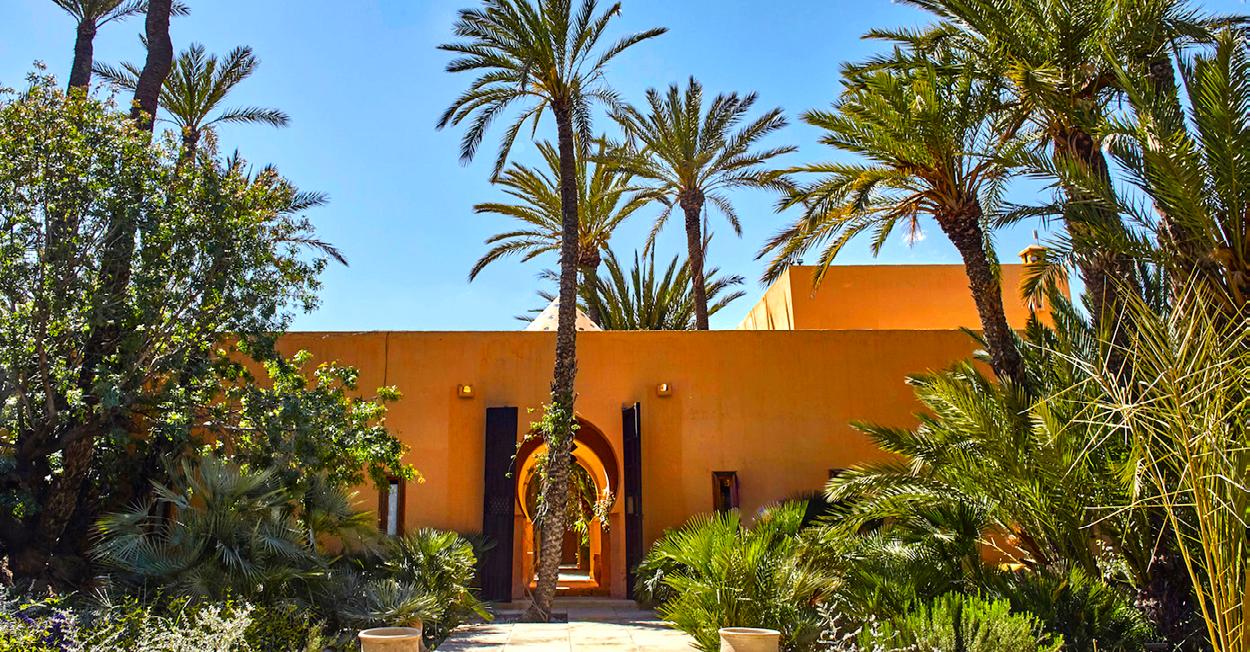
Mnemba IslandThrough My Lens
After two decades of anticipation, Emma experiences the secluded paradise of Mnemba Island, off Zanzibar's northeast coast.
 By Emma Jude
By Emma Jude
I remember paging through a travel magazine as a teenager and reading about a tiny private island off the East Coast of Africa that visitors could walk around in ten minutes. I remember feeling captivated by the photographs and telling myself that one day I would visit the island. Cut to almost two decades later and I finally found myself at andBeyond Mnemba.
Mnemba Island is located a short boat trip off the Northeastern coast of Zanzibar. It is made magical by an andBeyond team that serves a luxe market but with all of the comfort, freshly caught fish, and bare-footness you’d want of an island stay and without any of the pretentiousness.
As a South African woman, with personal safety being a concern on the daily, the one thing I really loved and felt immense gratitude for while staying here was feeling so safe. Mnemba Island offers a complete central nervous system reset and no additional yoga or deep meditative breathing or wholesome food is required, although all those things are offered to guests too, it’s just simply being there. Living out one’s days in private and hidden beach bungalows and across a little beach bar and restaurant, all of which are entirely open to the elements, is deeply healing.

One might wonder what a photographer might do with themselves here, as tiny Mnemba Island has no local village to explore, which is one of my most rewarding things to do when I visit Zanzibar, but taking in the
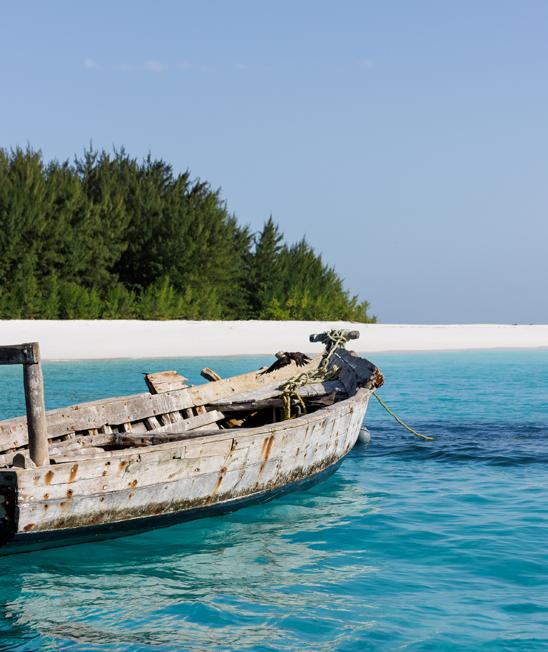

experience and documenting moments and moods in the peacefulness and gentle breeze of island life, allows for a different kind of creativity.




An East African Luxe Gift Guide
Whether you're seeking the perfect gift for a discerning loved one or treating yourself to a taste of the finest, this curated gift guide not only indulges your senses but also supports inclusive economic growth by spotlighting local products and businesses from East Africa.
By Kellen MaganjoKellen is a lover of moments and believes life is a canvas for us to enrich with beautiful experiences. She is a lawyer based in Kenya who seeks pockets of beauty wherever she goes.

Adelphi
A Nairobibased accessories brand, Adelphi is synonymous with timeless African luxury and celebrates a true African style that endures. From the elegantly crafted handbags to the versatile and classic briefcases, an Adelphi piece is the perfect enviable gift.

Procera African Juniper Gin
As the world’s first gin using fresh Juniper berries harvested in Kenya, Procera has earned its envious reputation. Famously quoted as ‘the only gin to be taken on a desert island’, you too can bring its luxury into your home.

House of Tayo
This distinctly Rwandan brand has garnered a dedicated following, owing to its effortless combination of sophistication and unconventionality. For the person who is not afraid to be bold, a custom House of Tayo design is the perfect addition to your clothing and accessories.

Saba Studios
Made in Lamu, the rich design language of the island seen in Saba Studio’s furniture creates a sense of deep nostalgia as I am reminded of days lounging; soothed by the sound of the ocean. These artfully carved and Swahili-inspired contemporary pieces are designed to transport you to a place of pure comfort.

Lokol Sandali Candle
The sensual scent of the Sandali Candle is a reminder that luxury dwells right under your nose. When lit, you will be wrapped up in luxurious notes of sandalwood and tobacco, enveloping you in a sensory experience of tranquillity. Designed in Kenya, the candle is made from 100% natural wax and comes with a lead-free wick made from natural fibres.

24 Hours in Paje, Zanzibar

Fay, an East African who's left her mark across 10 countries on 3 continents, introduces you to the epitome of luxury living. Fay embodies the essence of a digital nomad - embracing the freedom to work from any corner of the world, be it a serene island or a bustling city.
 By Fay The Nomad
By Fay The Nomad
Stay : Touching down in Paje means staying at Johari by Nafsi Nomad. Situated in the heart of vibrant Paje, this haven boasts proximity to culinary delights and recreational pursuits. As a digital nomad, the seamless blend of work and leisure against a scenic island backdrop feels like an ultimate life hack. What sets Nafsi Nomad apart is its proud Black ownership, homage to local artisans, and a chic yet minimalist Swahili-inspired interior. Uninterrupted Wi-Fi connectivity further fuels my work mode.


Morning: Start the day with a tranquil beach stroll leading to Zanzibarista. This open, ocean-view spot offers the finest coffee, including their essential iced version, a perfect indulgence in Zanzibar's tropical climate.


Adventure Time: Post-coffee, head to Aquaholics, your gateway to adventure. Paje beckons with kite surfing and I lean towards surfing, especially during the ideal season (June - October and December - March), tailored for beginners seeking an adrenaline rush.
Lunch: Recharge with an exquisite meal at Zanzilovers, a seafood haven at Mapacha Street Food Court. A grilled fish (often the day’s freshest catch) with their homemade pili pili (chilli) is my go-to, encapsulating the coastal essence with its Swahili flavours.
Sunset Magic: As the day wanes, Kae Funk Sunset Beach Bar awaits for a captivating sunset soiree. Bask in the opal hues as the sun dips, accompanied by an acrobatic spectacle and the warmth of a bonfire.
Fay's 24-hour Paje journey invites you to embrace luxury, where cultural heritage and digital nomadism converge amidst Zanzibar's beauty.
Here’s your chance to win 2 free flights!
Get ready for Nomad’s latest giveaway. We’re always on the lookout for hot new topics, and this time we want to hear all about conservation.

The Challenge:
Craft an original, mind-blowing conservation tale in 800 words or less. Dive deep into the heart of nature's wonders, unveil unique journeys, or spotlight some interesting regenerative projects.
The Rules:
• Originality: Your story must be a unique, never-before-published piece.
• Conservation Focus: We want to hear about how your story centres around conservation.
• Submit on Time: Send us your masterpiece via the QR code link by Tuesday 10th October.
• Join the Club: Sign up for the Nomad Travel Club via the same QR code we've provided.

The Rewards:
• Magazine Feature: The winning story will grace the pages of our November magazine.
• Free Flight: Pack your bags because you could win a free flight to Safarilink destinations in Kenya, to be redeemed by the end of the year!
May the best story win!
